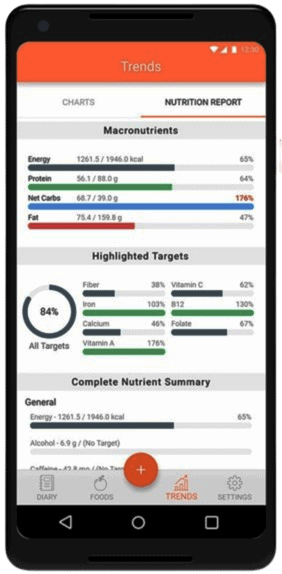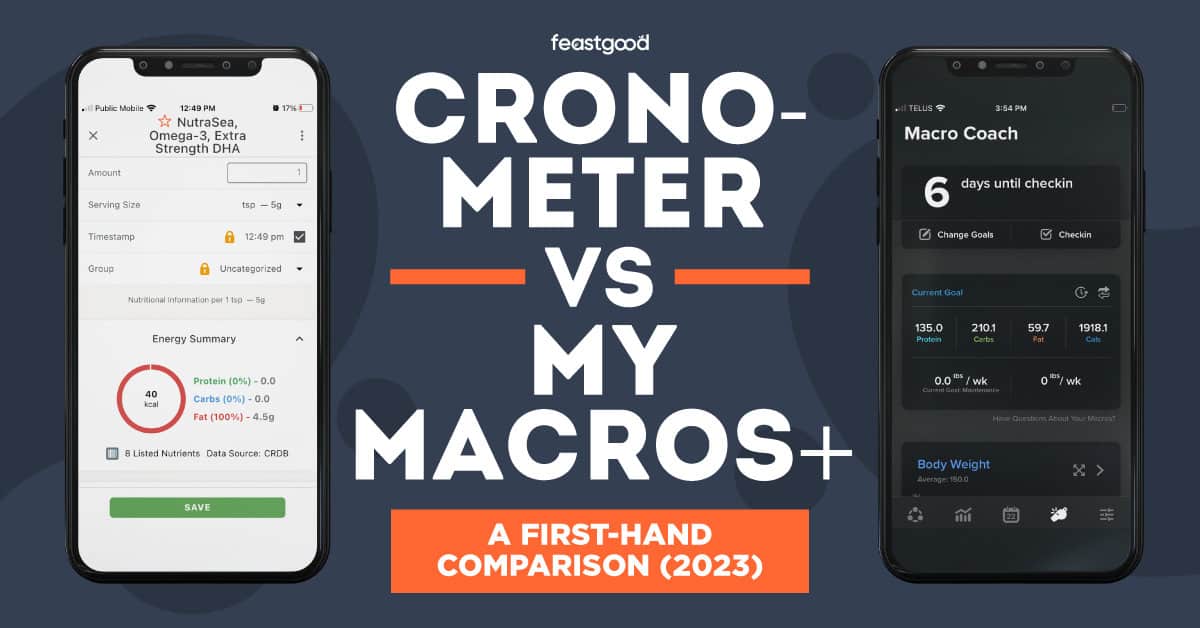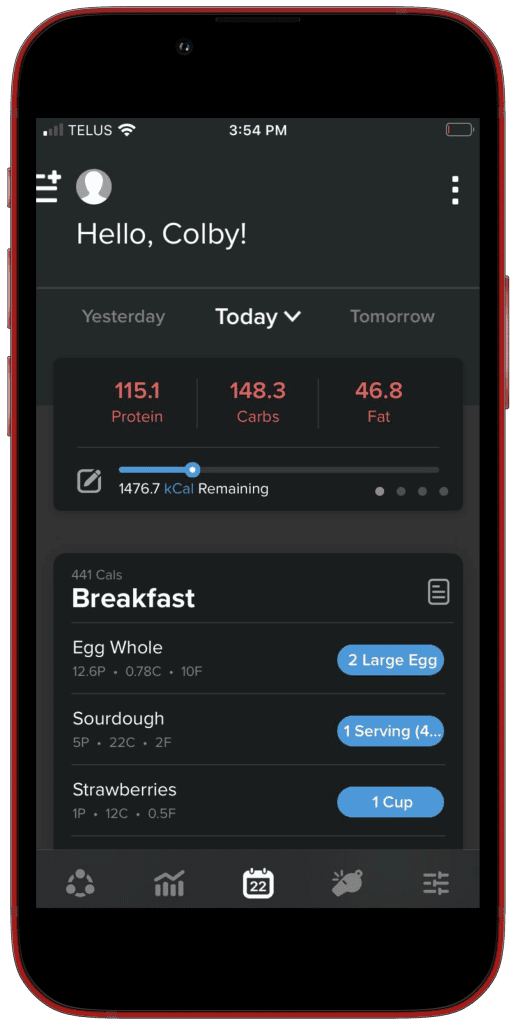Some links in this article are affiliate links, which means we earn from qualifying purchases. Learn more.
I’ve already raved about Cronometer for its tracking capabilities, but what about when compared with other popular nutrition apps, like MyMacros+? Below, I’ll discuss the benefits and drawbacks of each app and make my recommendation.
Key Takeaways
- The main difference between Cronometer and MyMacros+ is that Cronometer has a fully verified database compared to MyMacros+ database, which is missing many brand-name foods. Cronometer also provides more info on micronutrients.
- Cronometer was the winner in 6 of 10 categories reviewed. MyMacros+ won one category, with the remaining three categories being tied (more on this later).
- The cost of MyMacros+ is $1.99/month for basic features compared to a free version of Cronometer that most people can use and stick with long-term.
- Cronometer is best for those who want to track their macros and micronutrients or individuals who need very detailed information, such as people who are managing a health condition or high-level athletes.
- MyMacros+ is an option for those who want custom macro suggestions to help them reach their body weight and/or body composition goals without working with a coach and don’t mind creating custom entries for foods that aren’t in the database.

Overall Rating: 4.4/5
Cronometer

Overview
Features
Best For
*This link gets you 10% off the gold plan. No code is required.

Overall Rating: 4.0/5
Medical Disclaimer: The content of this article is provided for educational insights only. It should not be used as medical guidance. Individuals with a past of disordered eating should refrain from weight loss programs or calorie tracking. For medical advice, consult a certified healthcare professional. If you’re struggling with eating disorders, contact NEDA for assistance.

What Is Cronometer?
Cronometer is not just a nutrition app. It goes beyond just tracking calories or macros. It allows users to track lab test results, micronutrient intake, and various biomarkers, making it a comprehensive health app.
When it comes to body weight and/or body composition goals, Cronometer tracks your daily food intake against customizable targets for calories, macronutrients, and micronutrients. This can help you meet your goals, whether for weight loss, weight gain, or management of a health condition.
Cronometer has many reports available, including a detailed daily summary showing intake of micronutrients against recommended daily values. You can also generate custom reports to compare variables against each other or track desired items over time.
Read my complete review of Cronometer.
Pros
- Energy (calorie) settings can be customized
- Database of foods is fully verified, including name brand entries submitted by users
- Micronutrient information is detailed and extensive
- List of biomarkers to track is extensive
- Reports are both standardized and can be customized
- Recipes can be created, imported, and shared with friends
- Community support is available in several different formats
Cons
- Calorie counts only display when you click on the entry in the search results
- Foods appear in one big list in the free version as there is no option to group them into separate meals/snacks
What Is MyMacros+?
MyMacros+ is one of the most user-friendly nutrition apps. It allows you to set personalized nutrition goals and then track your food and water intake. However, it is the only app I know of with no free version.
Even though the basic version of MyMacros+ requires payment, many features are only available at an even higher cost in the premium version.
That said, one of the most valuable premium features is the Macro Coach.
This functionality will use your current age, weight, height, gender, body fat percentage, AND current macronutrient intake (5-day history) to determine a starting recommendation for macronutrients to achieve your goal.
Each week, the Macro Coach will update the targets based on your results (weigh-ins).
For example, if you are not losing weight, it will lower your targets; if you are losing weight too quickly, it will increase your targets to keep the rate of loss in a healthy and sustainable range.
This is one of the most impressive features of the app and can make the price tag worth it if you do not have the budget for a nutrition coach.
Read my complete review of MyMacros+.
Pros
- A history of your most recent and commonly eaten foods is maintained for easy tracking
- Macro targets can be set by gram or by desired percentage of total calorie intake
- Macro Coach feature provides customized targets, updated weekly
- Community support is available in a Facebook group
Cons
- No free version
- Many common brand name foods are not in the database
- Exercise tracking is only possible in a separate paid app (MyWorkout+)
Cronometer vs. MyMacros+: Head To Head Comparison
1. Food Database
Cronometer
All of Cronometer’s database entries are verified.
The app focuses on lab-analyzed data from the Nutrition Coordinating Center Food & Nutrient Database (NCCDB) or the United States Department of Agriculture National Nutrient Database for Standard Reference (USDA).
Any entries submitted by users have to include a photo of the nutrition label, and these entries are verified by Cronometer staff before they are added to the public database.
In the meantime, the individual user can log the food as a custom item in their own diary.
MyMacros+
Many users, including our staff tester Colby Roy, find the food database for MyMacros+ disappointing.
While there is a barcode scanner to make it easier to log foods, many times there is no corresponding entry in the database.
The app also didn’t have entries for common franchise restaurant food items, which usually have readily-available published nutritional information that is loaded into tracking apps.
The Winner: Cronometer
Cronometer’s verified database and the ability to get custom user items added to the public database makes it the winner in this category.2. Tracking Capabilities
Cronometer
There is very little that Cronometer doesn’t track.
In fact, if you wanted to track something that wasn’t already in its list, you could create a custom entry.
Cronometer tracks health metrics such as sleep, mood, heart rate, and lab results such as blood pressure on top of inputs such as food (calories, macronutrients, and micronutrients), water, and exercise and outputs such as weight, body fat percentage and measurements.
MyMacros+
MyMacros+ tracks food (calories, macronutrients, and limited micronutrients) and water intake, and weight, body fat percentage and waist size.
The Winner: Cronometer
Cronometer’s comprehensive health tracking options include everything that MyMacros+ tracks, and then more.3. Calorie Recommendations
Cronometer
Cronometer’s calorie recommendations can be customized by adjusting estimated basal metabolic rate (how many calories you burn just to stay alive each day) and activity level, or they can be overwritten completely if you want to put in your own (or your coach’s) values.
This makes it very easy to fine-tune the calorie targets to meet your weight goals (maintenance, gain or loss).
MyMacros+
MyMacros+ is also completely customizable when it comes to calorie and macronutrient targets.
The bonus is that the Macro Coach feature in the premium version will actually make a personalized recommendation that includes an analysis of your current intake and weight.
The Winner: MyMacros+
The Macro Coach features in MyMacros+ provides extra value when it comes to calorie recommendations.4. Level of Customization
Cronometer
Cronometer has one of the most customized interfaces I’ve ever seen in a diet tracking app.
You can customize your daily dashboard to only show the macronutrients and micronutrients you want to see, and you can even tell the app what screen to start on when you open it up (e.g. Diary versus Home screen).
Next, you can create custom graphs, reports and charts.
For example, I’ve been tracking my magnesium intake compared to my hours of sleep, to see if taking a magnesium supplement helps me to sleep for longer.
MyMacros+
MyMacros+ allows for customization in terms of calories and macronutrients (described above), but it does not have all of the custom reports and views that exist in Cronometer.
The Winner: Cronometer
Cronometer’s multiple options for customization give it the edge in this category.5. Education Opportunities
Cronometer
“Ask the Oracle” is a cool feature in Cronometer that tells you what foods are the best sources of a given micronutrient.
I wasn’t used to paying attention to micronutrients before I started using Cronometer. I just took a multivitamin and hoped for the best. Now I can log my multivitamin and my food to see if I am actually getting enough (or too much) of any micronutrient.
Cronometer’s reports showed me that my phosphorus intake was too low. I found out the best food sources for phosphorus using “Ask the Oracle.” Now I can hit the Recommended Daily Allowance (RDA).
I thought this education about micronutrients (both learning the RDA and what foods provide what micronutrients) was very valuable.
MyMacros+
MyMacros+ will help users understand the nutritional content of food, in terms of calories and macronutrients.
Plus, the MacroCoach feature will help teach them strategies to know how to adjust macros to achieve their goals if they pay attention to what adjustments are made when, rather than just blindly following the suggested targets without knowing why.
The Winner: Tie
Cronometer’s “Ask the Oracle” feature and MyMacros+ “Macro Coach” are each unique features found only in these apps. They provide different, but valuable and useful education to users.6. Coaching
Cronometer
Cronometer doesn’t have its own coaches on staff the way Noom does (click to read my review), but Cronometer does have a membership called Cronometer Pro which provides a dashboard for coaches to monitor clients’ intake, and a way to communicate with clients directly in the app.
Cronometer’s recipe-sharing feature also means that coaches can give clients recipes to help them hit their macros, or inspire them with healthy meal ideas.
MyMacros+
MyMacros+ Macro Coach feature provides customized macronutrient targets that are updated based on weekly weigh-ins.
But, this isn’t the same as interacting with a human coach who can help you trouble-shoot challenges, or explain why the targets are changing the way they are.
However, the Macro Coach feature is $9.99/month, which is much less than what you would pay for a nutrition coach, which makes it a budget-friendly option.
The Winner: Tie
Cronometer Pro is a great way to work with a coach, but this is an additional cost outside of the app. Macro Coach provides a lower-cost option to get at least some guidance with new suggested macronutrient targets.7. Recipe Database
Cronometer
Cronometer does not have a recipe database that users can search, but it is possible to create, import and share recipes with friends or coaches (sharing is limited to the paid Gold version or the Cronometer Pro option with a coach).
My favorite part about Cronometer recipes is that there is a Notes page where you can record instructions for making the recipe.
Many apps only allow you to input the ingredients, but there is nowhere to describe how to mix them together, or how long to bake or cook them, or at what temperature.
This feature in Cronometer saves me from having to also look up the recipe, either online or in a cookbook.
MyMacros+
MyMacros+ also allows users to create recipes, but there is no option to import recipes from a URL, and no option to share recipes with other users.
The Winner: Cronometer
The ability to import and share recipes in Cronometer, plus the Notes page for instructions when creating a recipe, makes Cronometer the winner for the Recipes category.8. Exercise Calories
Many nutrition apps will estimate how many calories are burned from exercise when exercise is logged or synced from another app (like an Apple Watch).
Some apps will automatically add these estimated calories to your daily total. However, your daily total might already include an amount for activity, and you don’t want those calories added.
I’ll cover what each app does with exercise calories:
Cronometer
For exercise calories, Cronometer has two settings:
- Users can import “activity calories” from activity trackers like FitBits or Apple Watches and can use these activity calories instead of a calculated “activity multiplier” that is used in estimating total calories burned for the day (TDEE: total daily energy expenditure).
- Users can also decide whether exercise calories should be ignored, or added to their total daily calorie target.
MyMacros+
MyMacros+ does not have an option to record exercise directly in the app.
Instead, you have to download and pay for an additional app, MyWorkout+. We did not test this additional app.
The Winner: Cronometer
The ability to import and share recipes in Cronometer, plus the Notes page for The fact that you cannot track exercise directly in MyMacros+ puts it on the losing side.9. Price
Cronometer
Cronometer has a ton of amazing features in its free version.
The only things that are not included are recipe sharing and the ability to log foods in separate meals. These two features exist only in Cronometer Gold.
A Cronometer Gold membership is less than $5 per month, at a rate of only $49.99/year.
MyMacros+
There is no free version of MyMacros+. For the basic functionality, the price is $1.99/month. The premium version is $9.99/month. MyWorkout+ is an additional $2.99/month.
The Winner: Cronometer
Cronometer has a lot of functionality in its free version, and the Cronometer Gold cost is lower than the MyMacros+ premium cost.10. Reviews
Cronometer
Cronometer has 4.7 / 5 stars from over 41 thousand reviews in the Apple App Store.
Users love being able to track more than just calories and macros and really focus on their health.
It is ranked #34 in Health & Fitness.
MyMacros+
MyMacros+ also has 4.7 / 5 stars in the Apple App store, but only 26 thousand reviews.
It is ranked #4 in Health & Fitness (as of February 2023).
The Winner: Tie
Both apps have a 4.7 star rating, but MyMacros+ is ranked higher in the Health & Fitness category. That said, they are not in the same category within Health & Fitness, because the rankings are split between “Top Free Apps” and “Top Paid Apps” so it is not exactly a side-by-side comparison.Cronometer vs. MyMacros+: Quick Overview
| Cronometer | MyMacros+ | Our Interpretation | |
|---|---|---|---|
| Food Categorization | None - Cronometer doesn’t rank or rate foods. | None - MyMacros+ doesn’t rank or rate foods. | Both are calorie and macro tracking apps that don’t qualify foods as “good” or “bad.” |
| Tracking Capabilities |
|
| Cronometer has much more detailed and comprehensive tracking for macronutrients, micronutrients, and biometrics. MyMacros+ only tracks workouts if you download a separate paid app (MyWorkout+). |
| Calorie Recommendations & Accuracy | Calorie recommendations are accurate and can be customized further for advanced users. | Calorie recommendations are accurate and can be customized further for advanced users. | Both apps allow for customization of calorie recommendations, and seem to be accurate. MyMacros+ also considers current macronutrient intake when using the Macro Coach feature. |
| Level of Customization | Ability to customize calorie, macronutrient and selected micronutrient targets. Can also generate custom reports to compare variables of your choosing. | Ability to customize calorie and macronutrient targets, either by gram or by percentage. | Both apps allow for customization of calorie and macronutrient targets. MyMacros+ allows you to create unlimited meals/snacks whereas Cronometer has a limit of 8 meals/snacks per day. Cronometer allows you to generate custom reports to look at specific variables. |
| Education Opportunities | “Ask the Oracle” shows which foods are best for providing a given micronutrient. Plus, you’ll learn about nutritional info when logging food. | MyMacros+ provides basic nutritional info on calories and macronutrients but does not have formal education. | Cronometer allows users to learn about recommended intake of micronutrients as well as macronutrients. MyMacros+ is a tool for data collection that will give users information about serving sizes, calories, and macronutrients. |
| Coaching | None | Macro Coach is available in the premium version of the app, which provides customized calorie/macronutrient goals that are updated based on results. | Cronometer is a self-directed app, but it does have a coaching dashboard for nutrition coaches. MyMacros+ has a built-in coaching feature with Macro Coach (premium). |
| Recipe Database & Meal Planning | There is no recipe database and no meal planning functionality. Users can create, import and share recipes. | There is no recipe database and no meal planning functionality. | Neither app has a recipe database, but Cronometer does allow users to create, import and share recipes. MyMacros+ is limited to creating personal recipes. |
| Exercise Calories | Choice to include exercise calories or not. | Exercise tracking requires a separate app (MyWorkout+) for an additional $2.99/month. | Cronometer lets you choose whether exercise calories are added to daily totals; we did not test the MyWorkout+ app for MyMacros+. |
| Price |
|
|
|
| Reviews | 4.7/5 for 41k reviews | 4.7/5 for 26.5k reviews | MyMacros+ doesn’t have as many reviews or downloads; it does not seem to be as popular. |
Other Cronometer App Comparisons
About The Author

Lauren Graham is a Precision Nutrition Level 1 certified nutrition coach. She focuses on helping busy professionals balance healthy eating and purposeful movement. Lauren has a background in competitive swimming and is currently competing as a CrossFit athlete. She has a passion for training, teaching, and writing.
Why Trust Our Content

On Staff at FeastGood.com, we have Registered Dietitians, coaches with PhDs in Human Nutrition, and internationally ranked athletes who contribute to our editorial process. This includes research, writing, editing, fact-checking, and product testing/reviews. At a bare minimum, all authors must be certified nutrition coaches by either the National Academy of Sports Medicine, International Sport Sciences Association, or Precision Nutrition. Learn more about our team here.
Have a Question?
If you have any questions or feedback about what you’ve read, you can reach out to us at [email protected]. We respond to every email within 1 business day.

